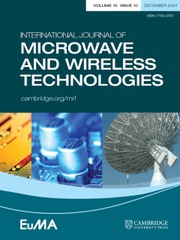Welcome to this special issue of the International Journal of Microwave and Wireless Technologies (IMJWT) dedicated to the 18th edition of the European Conference on Antennas and Propagation (EuCAP), which was held in Glasgow, Scotland, UK, between 17 and 22 March 2024.
EuCAP is organized by the European Association on Antennas and Propagation (EurAAP), an association dedicated to advancing research and development in the field of Antennas and Propagation. EurAAP’s mission is to promote knowledge exchange among scientists and engineers, while fostering collaboration between businesses, universities, local companies, and the broader scientific and engineering community. Its activities are built on four main pillars: the flagship EuCAP conference, the European School of Antennas, the scientific journal Reviews of Electromagnetics, and a range of focused Working Groups. For more information, please visit www.euraap.org.
Over the past few years, a strong mutual technical interest has fostered a close and growing cooperation between EurAAP and the European Microwave Association (EuMA). As part of this collaboration, EurAAP has once again been invited – this year for the seventh consecutive time – to curate a guest issue of the International Journal of Microwave and Wireless Technologies. This issue features a selection of high-quality contributions from EuCAP 2024, covering topics of broad relevance to the microwave community. The extended versions of these conference papers reflect our shared passion for microwaves with EuMA and the readership of IJMWT.
For this special issue, we invited extended versions of selected papers presented at EuCAP 2024, which featured a total of 828 contributions. Each paper submitted to EuCAP 2024 underwent a thorough peer-review process, involving at least four expert reviewers, in accordance with the standards set by the EuCAP 2024 Technical Programme Committee. We hope that this special issue provides enjoyable and inspiring reading, encouraging new ideas and scientific collaborations. We would like to extend our gratitude to the authors, reviewers, the journal’s editorial team, and especially the Editor-in-Chief of IJMWT for their invaluable support in bringing this issue to life.

Mauro Ettorre is Professor at Michigan State University, East Lansing, USA. Previously, he was a Research Scientist at the Centre National de la Recherche Scientifique (CNRS), IETR laboratory, France. Since 2017 and 2023, he has served as Associate Editor and Track Editor for the IEEE Transactions on Antennas and Propagation. He is a member of the Board of Directors of EurAAP. Dr. Ettorre is the 2024 IEEE MTT-S and AP-S Inter-Society Distinguished Lecturer. His research interests include the analysis and design of quasi-optical systems, periodic structures, wideband arrays, millimeter-wave antennas, and localized waves. His research activities have been recognized with several awards, including the Innovation Award at the 2018 ESA Antenna Workshop, the Best Paper Award in Electromagnetics and Antenna Theory at EuCAP 2018, the Best Antennas Paper Award at EuCAP 2021, and Best Paper Award at the iWAT 2023.

George Goussetis is Professor of Microwave and Antenna Engineering at Heriot-Watt University where he also serves as Associate Executive Dean for Enterprise. He has authored or co-authored over 500 peer-reviewed papers, several book chapters, one book, and six patents. His research focuses on microwave and antenna components and subsystems, particularly for satellite applications. He has held research fellowships from the Onassis Foundation (2001), the UK Royal Academy of Engineering (2006–2011), and the European Commission Marie Skłodowska-Curie programme (2011–12, 2014–17). His distinctions include the ESA Young Engineer of the Year Award (2011), the Bell Labs Prize (2016), and the IEEE Proceedings Best Paper Award (2024). Dr. Goussetis served as Associate Editor to the IEEE Antennas and Wireless Propagation Letters between 2014 and 2018 and as Chair of the European Conference of Antennas and Propagation (EuCAP) 2024.


